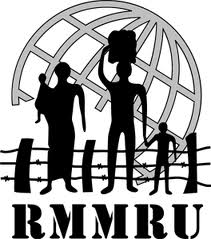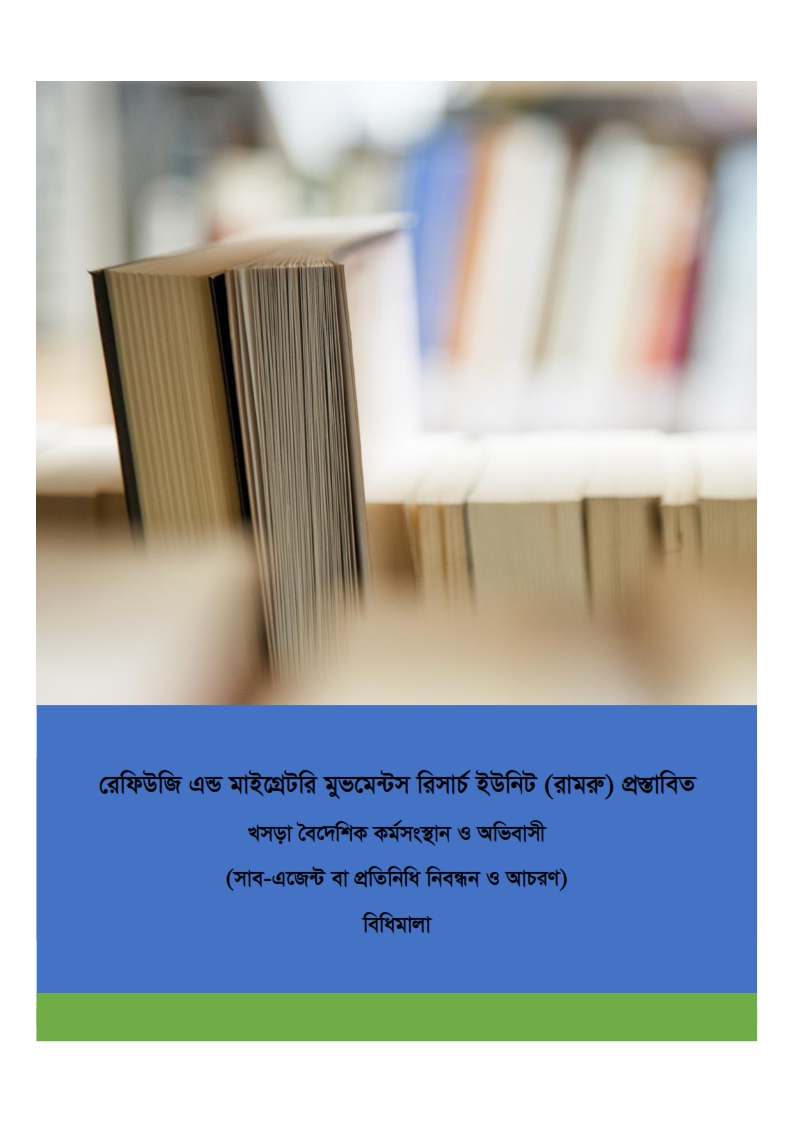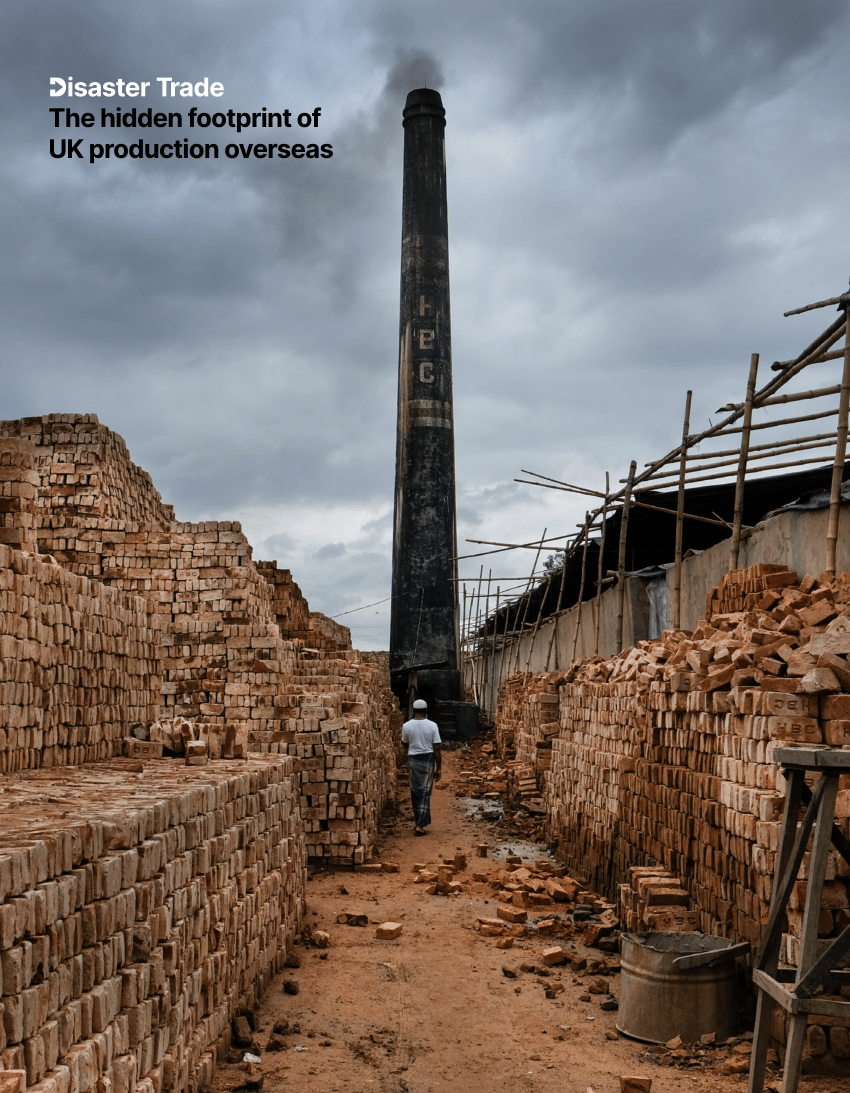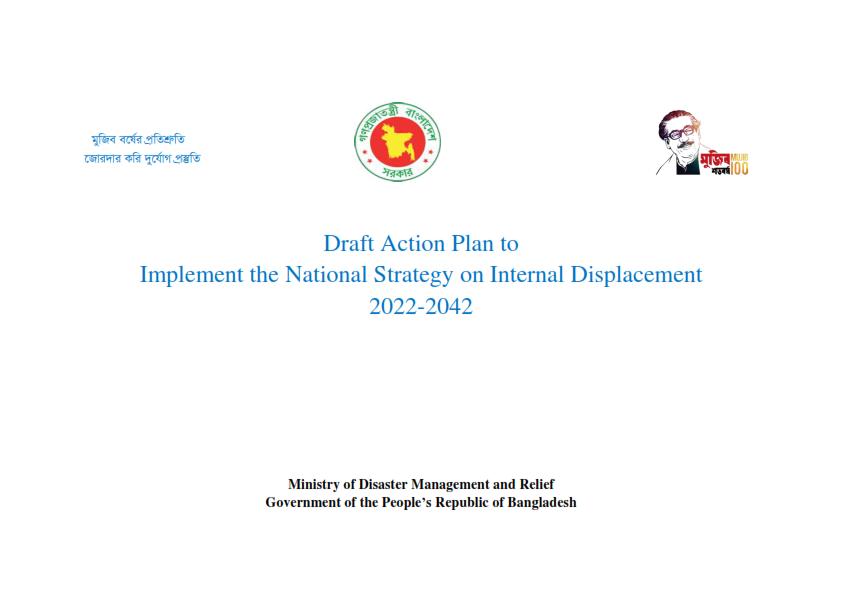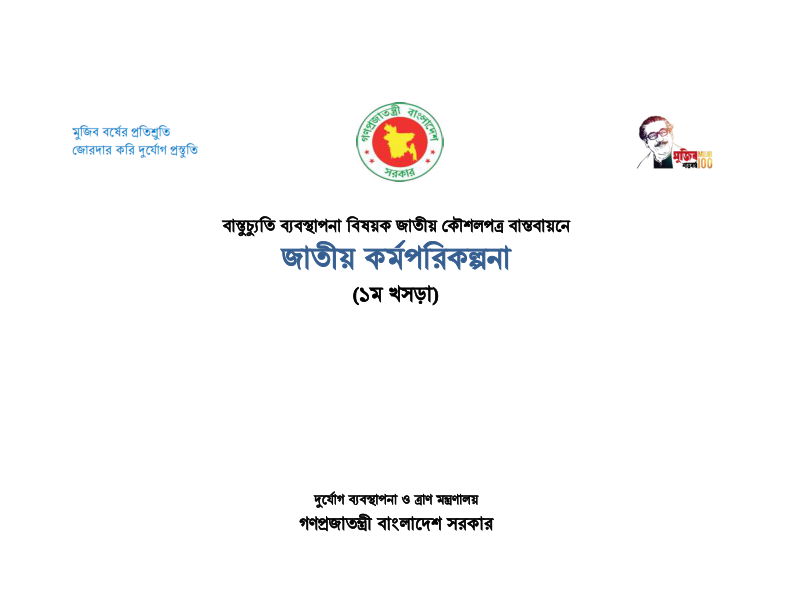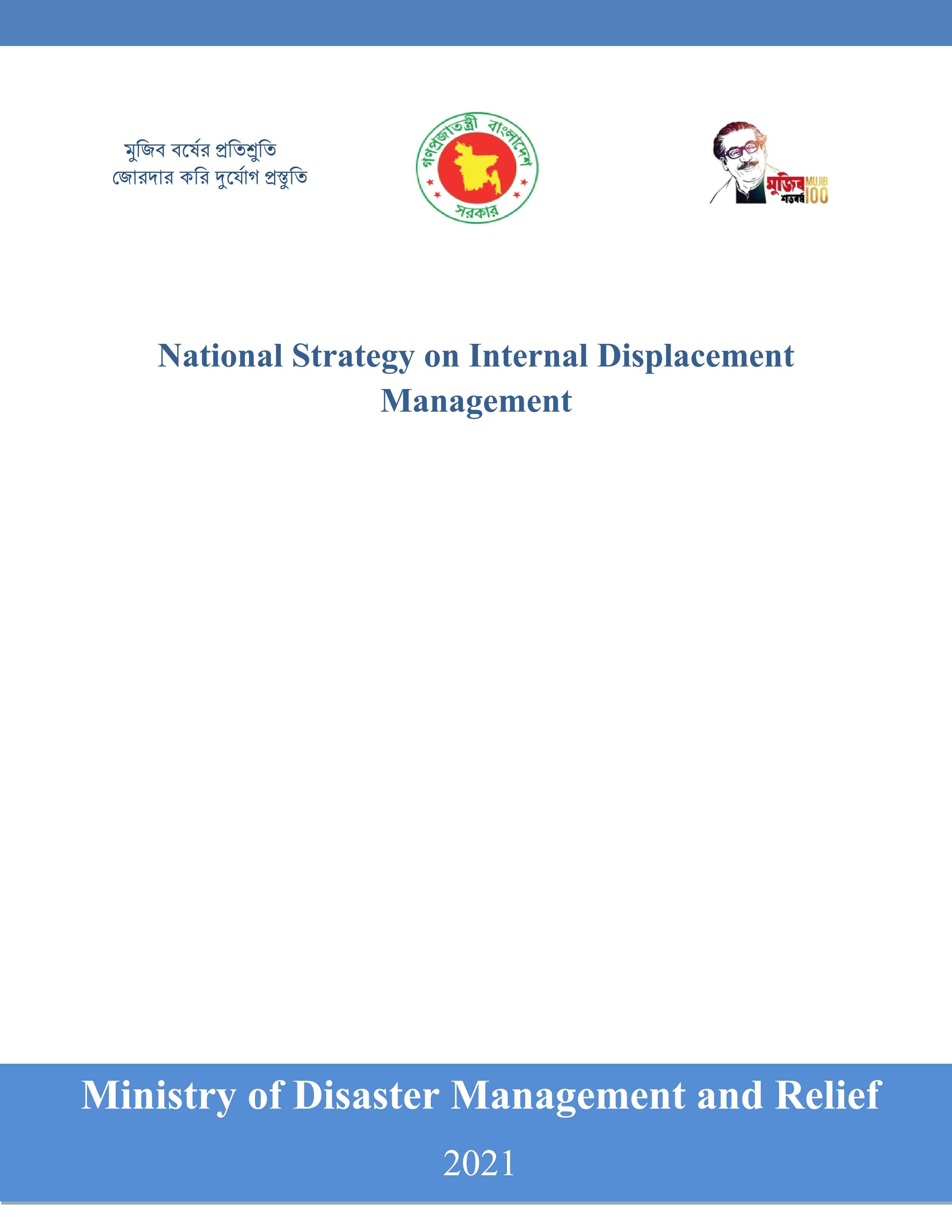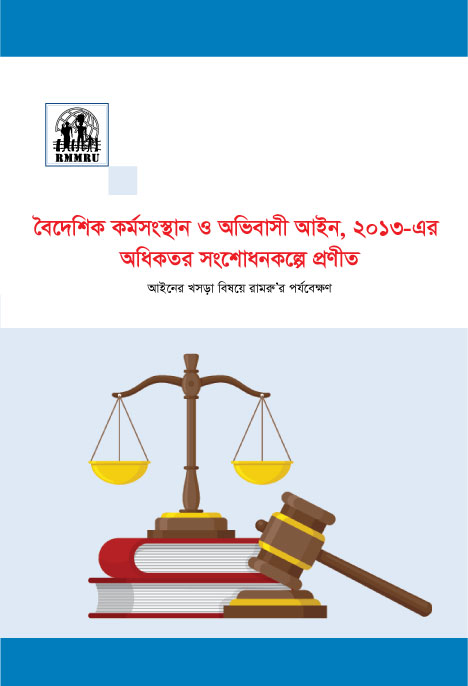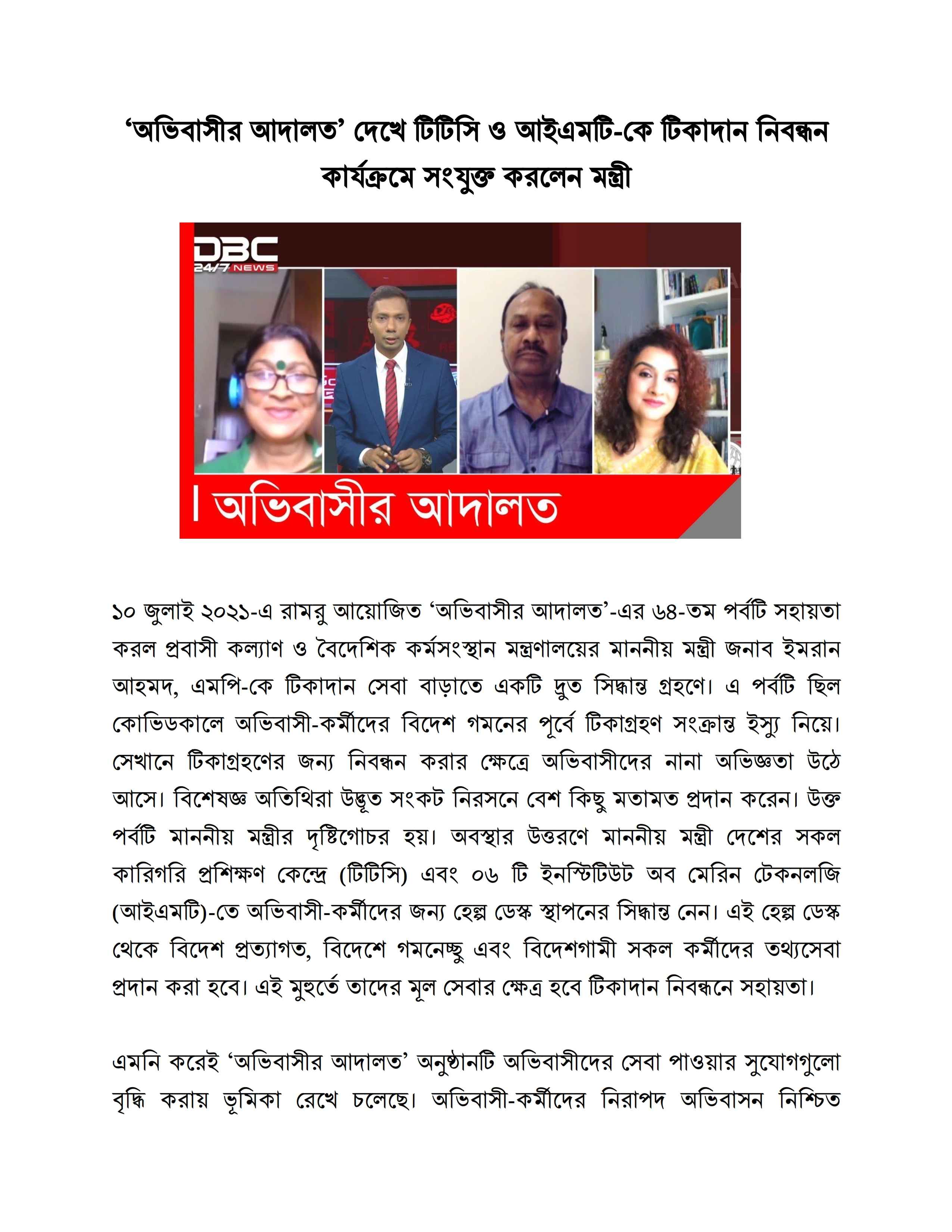Since RMMRU's beginnings in 1995, we have been committed to research and advocacy that result in effective policy change. Researchers and staff at RMMRU not only engage in field research and community level, grassroots advocacy, but also in collaboration with international organizations such as World Bank, the UN, IOM, etc. and national government ministries. Below are listed some of RMMRU's policy influences toward improved migrant and refugee treatment and rights recognition.
Proposed draft Rules of Sub Agent by RMMRU
Click here to read
A brief of the 'Disaster Trade: The Hidden Footprint of UK Production Overseas' findings were accepted as evidence to the UK parliament's call on Trade and the Environment. It has been published on the UK Parlimeant website.
Click here to read
Draft Action Plan to Implement the National Strategy on Internal Displacement 2022-2042
Click here to read
বাস্তুচ্যুতি ব্যবস্থাপনা বিষয়ক জাতীয় কৌশলপত্র বাস্তবায়নে জাতীয় কর্মপরিকল্পনা (১ম খরড়া)
Click here to read
National Strategy on Internal Displacement Managment 2021
Click here to read
বৈদেশিক কর্মসংস্থান ও অভিবাসী আইন সংশোধনকল্পে আইনের খসড়া: অভিবাসীদের অধিকার সুরক্ষায় রামরু’র সুপারিশমালা
Click here to read
অভিবাসীর আদালত’ দেখে টিটিসি ও আইএমটি-কে টিকাদান নিবন্ধন কার্যক্রমে সংযুক্ত করলেন মন্ত্রী
Click here to read
Most Bangladeshi migrants did not have bank accounts before migration, and in their time abroad, it is impossible to open an account in a Bangladeshi bank. Without bank accounts, remittances are not used productively. Mandatory bank accounts will play a vital role in remittance investment for migrants. In cases of fraudulence, job termination, or injury, savings in a bank account will provide migrants with long-term security.
RMMRU organized a conference that involved academics, banks, financial institution, concerned ministry officials, journalists, rights and development activists and members of national and international organizations on September 9, 2012. The conference recognized the positive role of remittances on national Bangladeshi economy and the potential of mandatory bank accounts for migrant workers.
Chief Guest of the conference, Honorable Secretary of Expatriates’ Welfare and Overseas Employment Ministry Dr. Zafar Ahmed Khan, highlights that mandatory bank account will help tremendously to collect remittance through formal channel and agrees to implement this within government. Ms. Shamsun Nahar, Director General, BMET confirms BMET accordance with ensuring mandatory bank accounts for departing migrants undergoing final clearance from BMET.
The “Pay Cash Exclusivity Clause” restricted banks from establishing money transfer arrangements with any other bank. This limited migrant workers from using formal channels to transfer remittances home to Bangladesh. More money is lost through the use of informal channels and intermediaries.
RMMRU launched a policy campaign on this from June 2009. It organized several meetings with high Bangladesh Bank officials and public and private bank top policy makers. After the policy dialogue held on October 23, 2010 the Governor of Bangladesh Bank officially announced that the bank will take necessary steps to withdraw the clause.
On December 13, 2010, the Bangladesh Bank issued a circular to all public and private banks and remittance houses to withdraw exclusivity clause from their current arrangements of money transfer and banned the implementation of similar clauses in any future arrangements.
Under the MRIS project, RMMRU is engaged in capacity building of the DEMO officials of all 42 districts in Bangladesh. During the workshops the DEMO officials voiced the need for institutional incorporation of DEMO, BMET and the Expatriates’ Welfare and Overseas Employment Ministry in the upcoming 6th Five-Year Plan. The initial draft of Bangladesh’s 6th 5-year plan made no emphasis on migration.
RMMRU prepared a document entitled ‘Targeting Good Governance: Incorporation of Migration in the 6th Five-Year Plan’. It was presented in a dialogue held on June 2, 2010. The policy document and dialogue facilitated interaction with and collaboration with the Finance Ministry and Planning Commission of the Expatriates’ Welfare and Overseas Employment Ministry.
An official DO of the Expatriates’ Welfare and Overseas Employment Ministry issued a statement about why migration should be incorporated in different sections of the 6th 5-year plan. Migration was considered and incorporated into the 6th 5-year plan.
Libya hosts a large number of Bangladeshi migrant workers. Due to civil conflict in Libya, at least 35,000 Bangladeshi workers were forced to return. They faced immense socio-economic and psychological pressure during their period of evacuation and rehabilitation in Bangladesh.
RMMRU collected segregated data of the returnees to identify their socio-economic situation, skill and experience. With instructions from RMMRU, MRPCs collected information through rapid primary level survey in project areas. RMMRU organized a dialogue emphasizing rehabilitation issues of the returnees and shared field findings with the participants of the workshop. Representatives from World Bank, BGMEA, BAIRA, BD Jobs, banks, and donor communities attended the programme.
Representatives from banks, international and national organizations, government and community level committees promised to work in collaboration for the rehabilitation of returnee Bangladeshi migrant workers from Libya. RMMRU published an article "Emergency Return of Bangladeshi Migrants from Libya" in conjunction with the Centre for Non-Traditional Security (NTS) Studies.
- 1990 UN Convention On the Protection of the Rights of All Migrant Workers and their Families
- Advocacy
- Policy Outcome
The 1990 UN Convention on the Protection of the Rights of All Migrant Workers and their Families is an international agreement between nations that recognizes that migrant rights are human rights and dictates the fair treatment and working conditions of migrant workers. It has yet to be ratified by all participating nations.
Since 1997, RMMRU campaigned nationally and internationally for the 1990 UN Convention, through several policy dialogues, workshops, seminars with government and civil society organizations.
In 2010, RMMRU brought Mr. Abdelhamid El Jamri, Chairperson of the UN Committee on the Protection of the Rights of All Migrant Workers and Members of their Families to Bangladesh. A bilateral meeting with the Law Minister of Bangladesh, Secretary of Expatriates’ Welfare, DG of BMET, Foreign Secretary, etc. witnessed the ratification of the 1990 UN Convention without reservation.
Remittances from migration play a positive role in the alleviation of poverty in Bangladesh. Challenges within the migration process make it difficult for migrant workers to maximize the flow of remittances back to Bangladesh. Restrictions in formal channels for remittance management was something that needed to be addressed in migration.
RMMRU prepared a report on policy reforms with suggestions for institutional and regulatory reforms for remittance management, followed by a participatory dialogue session during the remittance festival put together by RMMRU.
RMMRU submitted the findings report to the Governor of Bangladesh Bank with suggestions on how to establish good governance in remittance management.
